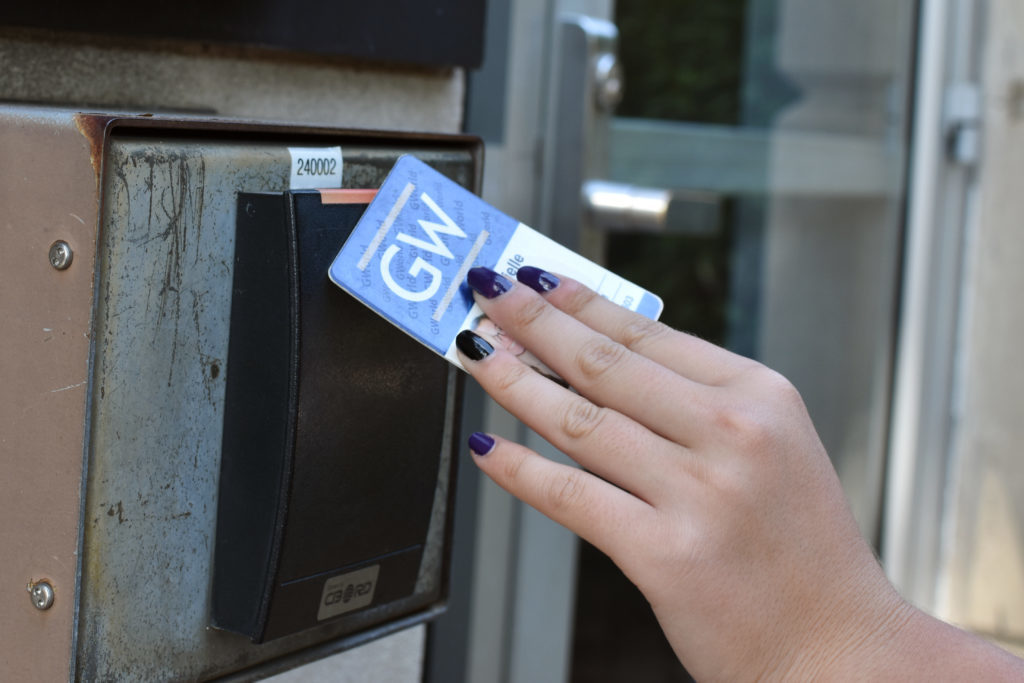As the University opens residence hall tap access to any undergraduate student, officials said they are evaluating residence hall security measures.
Officials said the move, which builds on the pilot program implemented for freshmen in January, will allow undergraduate students to more easily connect with one another in residence halls but may require an increased need for safety measures. Security experts said expanding tap access to all residence halls should be met with additional security measures, like increased front desk security, to ensure that only students are entering the halls.
Colette Coleman, the senior associate dean of students, said students can tap into any residence hall using GWorld, but only registered residents can unlock their individual rooms. Coleman said the system will allow students to host social events involving multiple residence halls because moving between buildings is less cumbersome.
“The continuation of this exciting initiative will continue the goals of enhancing our residential communities by allowing students to have greater opportunity to connect with peers who live in other halls,” Coleman said in an email.
She said the majority of students who used the pilot program last semester enjoyed the freedom to move between halls on their own, but some students voiced concerns to officials that the increased access could contribute to an uptick in “student behavioral issues.”
Mary Paradis, the interim chief of police, said the GW Police Department will adjust the number of student access monitors, who regulate tap-ins, and other security personnel stationed at each residence hall based on feedback from students, faculty and staff.
“We will compare the effectiveness of the new system to last year when a different plan was in place,” she said.
GW currently employs 150 to 200 student access monitors each year, but The Hatchet reported in November that student access monitors were not present in Amsterdam and South halls more than 95 percent of the time.
Student Association President SJ Matthews said she worked with the University to implement the new tap access system while serving as Residence Hall Association president last academic year and voiced approval for the change during her campaign for SA president.
“I also encouraged inter-hall programming between the first year halls during the pilot program so students could build community with people who lived in different residence halls,” she said in an email.
Of GW’s 12 peer schools, Georgetown, Wake Forest and New York universities indicate on their websites that they employ similar open tap access systems. Georgetown and Wake Forest universities prohibit students from entering other residence halls after midnight.
Security experts said officials should up the number of student access monitors at buildings and limit the hours during which students can access any residence hall to meet the increased security demand.
Gary Sigrist – the chief executive officer and president of the security company Safeguard Risk Solutions, which provides security products and services for U.S. universities and public schools – said that because the University’s key card system tracks which buildings each student enters, an open tap access system is not a large security risk. Sigrist said using metal keys in an open tap system instead of electronic cards could pose a security problem.
“If you lose your key, I can’t deactivate that key, and so you could have a student running around with the key and you never know what building that student went in because there’s no electronic access,” he said.
Sigrist said the University could add security cameras to each residence hall instead of increasing the number of student access monitors stationed at each building to address safety concerns brought on by the open tapping system. He said employing a few people to monitor cameras at each hall’s entrance is a cost-effective alternative to stationing more student access monitors at each residence hall.
The Hatchet found that student access monitors are often absent from residence halls located in busier areas of campus.
“Cameras are better than people,” he said. “The only reason for that is, how much are you willing to have your tuition go up to cover to pay for somebody to be there?”
Sigrist said that because the main culprits of property crimes – which constitute the majority of crimes that occur on or near campus – are not students, adding all-resident tap access won’t jeopardize students’ safety because only students can enter residence halls. He said the University may vet admitted students to ensure they don’t pose large risks to other students.
Michael Colegrove, the CEO and president of the security company Campus Safety Solutions, said officials should limit the times during which any student can access any residence hall to ensure students are accounted for at night.
Colegrove said officials could implement additional security measures, like adding a system to check students’ fingerprints to confirm their identities, in addition to increasing student access monitors’ presence at residence halls. He said the fingerprint would add another level of security to protect against stolen or lost identification cards.
Nine thefts occurred in residence halls over the summer, according to crime reports. Two residence halls – District and Shenkman – have food courts that can be accessed without using GWorld.
“It is opening up another avenue of access that normally wouldn’t be there, so I’m sure over time there will be some instances of situations where the wrong people are in the wrong place at the wrong time,” Colegrove said.



